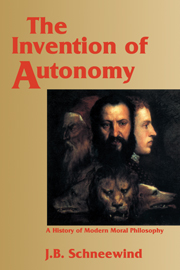Book contents
- Frontmatter
- Contents
- Preface
- Acknowledgments
- A note on references and abbreviations
- Introduction
- Part I The rise and fall of modern natural law
- Part II Perfectionism and rationality
- Part III Toward a world on its own
- 13 Morality without salvation
- 14 The recovery of virtue
- 15 The austerity of morals: Clarke and Mandeville
- 16 The limits of love: Hutcheson and Butler
- 17 Hume: Virtue naturalized
- 18 Against a fatherless world
- 19 The noble effects of self-love
- Part IV Autonomy and divine order
- Epilogue
- Bibliography
- Index of names
- Index of subjects
- Index of biblical citations
19 - The noble effects of self-love
Published online by Cambridge University Press: 05 June 2012
- Frontmatter
- Contents
- Preface
- Acknowledgments
- A note on references and abbreviations
- Introduction
- Part I The rise and fall of modern natural law
- Part II Perfectionism and rationality
- Part III Toward a world on its own
- 13 Morality without salvation
- 14 The recovery of virtue
- 15 The austerity of morals: Clarke and Mandeville
- 16 The limits of love: Hutcheson and Butler
- 17 Hume: Virtue naturalized
- 18 Against a fatherless world
- 19 The noble effects of self-love
- Part IV Autonomy and divine order
- Epilogue
- Bibliography
- Index of names
- Index of subjects
- Index of biblical citations
Summary
The article on “interest” in Diderot's Encyclopaedie opens with an account of the ambiguities of the word, expounds the view that proper self-love is the source of all the virtues, and deplores the efforts of Nicole, Pascal, and La Rochefoucauld to paint self-love as vicious. The Encyclopedist thinks that Lord Shaftesbury demands an impossible disinterestedness and moreover that he “does not sufficiently see that the noble effects of self-love, the love of order, of moral good, of benevolence, can influence only few of the actions of men living in a corrupt society.” Many eighteenth-century writers held that self-love might have generally noble effects even in a corrupt society. What is more, it might do so without causing us to be benevolent.
The new advocates of self-love opposed the sentimentalists no less than the rationalists. They did not, like Nicole, think our egoism a result of sin, and try to show how God could overcome it behind our backs. They were aiming neither to support an absolutist politics by showing that without it selfish human passions would lead us to self-destruction, nor to unmask all apparently generous and benevolent desires. They were not arguing that self-love, by increasing our concern for our long-term interest, can act as a countervailing force against the eruptions of the passions. They saw a psychology and morality of self-love as the sole theory able to make sense of our motives and actions and to guide them intelligently.
- Type
- Chapter
- Information
- The Invention of AutonomyA History of Modern Moral Philosophy, pp. 404 - 428Publisher: Cambridge University PressPrint publication year: 1997

